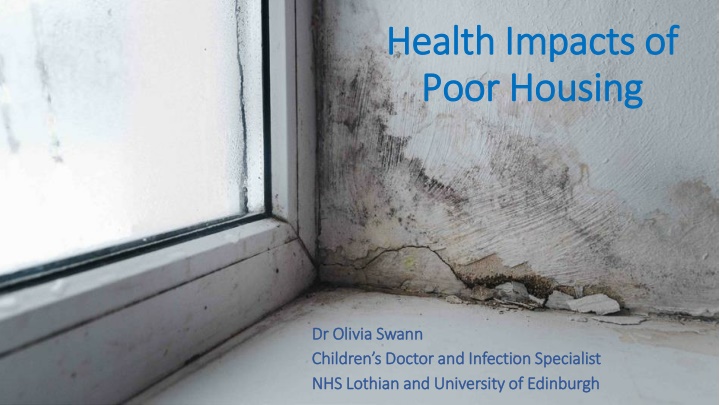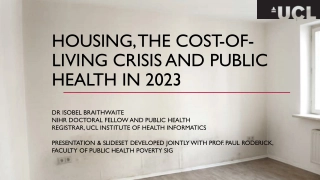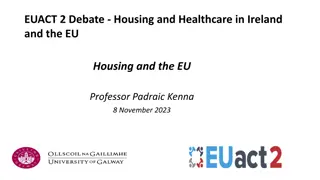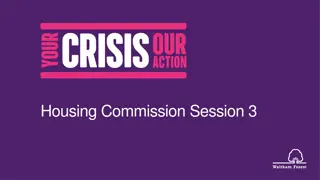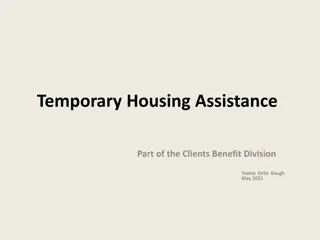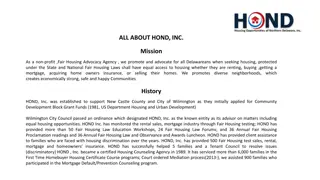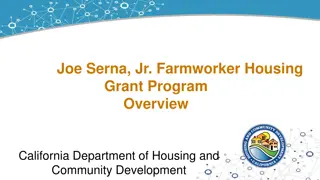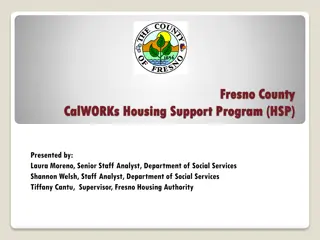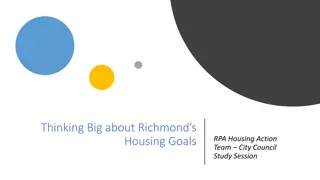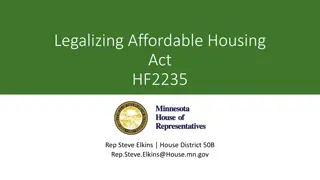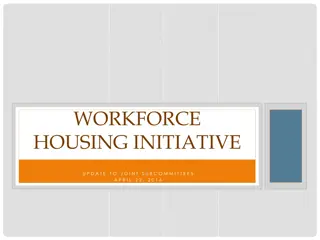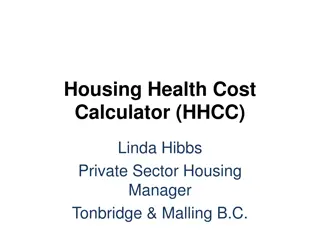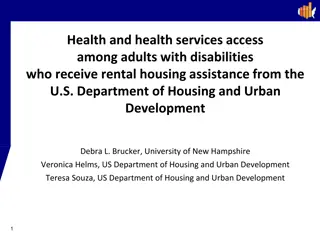Health Impacts of Poor Housing
Dr. Olivia Swann, a children's doctor and infection specialist, highlights the detrimental health impacts of poor housing, such as asthma, allergies, developmental issues, and even death, particularly in young children. The inadequate housing conditions, including exposure to mould and temporary accommodation, contribute to various health problems, emphasizing the importance of adequate housing as a fundamental human right. The situation is further exacerbated in Scotland due to old housing stock, energy poverty, and difficulties in heating homes, impacting the well-being of residents.
Download Presentation

Please find below an Image/Link to download the presentation.
The content on the website is provided AS IS for your information and personal use only. It may not be sold, licensed, or shared on other websites without obtaining consent from the author.If you encounter any issues during the download, it is possible that the publisher has removed the file from their server.
You are allowed to download the files provided on this website for personal or commercial use, subject to the condition that they are used lawfully. All files are the property of their respective owners.
The content on the website is provided AS IS for your information and personal use only. It may not be sold, licensed, or shared on other websites without obtaining consent from the author.
E N D
Presentation Transcript
Health Impacts of Health Impacts of Poor Housing Poor Housing Dr Olivia Swann Dr Olivia Swann Children s Doctor and Infection Specialist Children s Doctor and Infection Specialist NHS Lothian and University of Edinburgh NHS Lothian and University of Edinburgh
How in the UK in 2020 does a 2-year-old child die as a result of exposure to mould?
Homes are not just physical structures Adequate housing is a human right 1948 Universal Declaration of Human Rights Sir Michael Marmot
Asthma Respiratory illness Allergies Biological Developmental problems Cancer Asthma Respiratory illness Nutritional problems Children s growth Healthcare access Financial Chemical Risks to health Social Physical Respiratory illness Cardiovascular illness Asthma Physical injury Infectious disease Mental health
Hidden Impact of Temporary Accommodation 10,256 children died in England (2019 to 2023) Temporary accommodation was a contributing factor in 55 cases 42 were less than 1 year old 42 were less than 1 year old Co-sleeping Harder to sterilise Not adapted for small children 55 cases Incomprehensible and preventable Shared Health Foundation. 2024
Scotland Old housing stock Climate Rural communities Off mains gas Energy poverty Spending >10% income on fuel 20% in energy poverty ~ Half a million households Energy poverty income poverty 24% EP households not income poor Scottish Housing Conditions Survey 2019, Scottish Government. Dec 2020 Scottish Housing Conditions Survey 2021, Scottish Government. May 2023
Hard to heat homes Heat escapes from the home Type of property Age What it s made of Underheating leads to Cold Damp Mould
Increasing pressures Pandemic recovery Cost of living crisis War in Ukraine fuel price Cost of living insights: Energy. ONS. April 2023
October 2021 1 in 5 renters is being harmed by their housing
Children and young people www.hertfordshire.gov.uk/
Adults www.hertfordshire.gov.uk/
Older people www.hertfordshire.gov.uk/
Cold homes reduce immune systems can t fight off respiratory infections Cold temperatures reduce lung function - can trigger asthma attacks GP visits for respiratory infections increased by 19 per cent for every 1 C drop in outdoor temp <5 C Cold homes increase blood pressure, increasing the risk of strokes and heart attacks Cold homes associated with a build-up of markers for dementia and Alzheimer s in the brain Adults in cold homes The Marmot Review 10 Years On. 2020
Children in Cold Homes Children spend a lot a lot of time at home (especially preschool) Early years (0-6 yrs) crucial for growth and development Babies living in cold homes grow less well Need more calories for growth + staying warm grow less well Cold homes can impact a child s education Cold homes -> damp and mould 1.7 million school days lost in Europe due to damp and mould Hard to study in a cold home family crowded into heated room child s education Cold homes associated with multiple mental health risks 28% of children living in cold homes have >4 mental health symptoms vs 4% who lived in warm homes mental health risks The Marmot Review 10 Years On. 2020
Respiratory infections in children Big problem in preschool children Biggest reason for hospital infections Biggest reason for antibiotics Developing lungs and immune system 40 in every 1000 infants each year Disruptive for families Lifelong problems Time off work risk of asthma Loss of earnings risk of dying of respiratory problem as an adult
Cold homes and respiratory illness in children Cold temperatures less resistance to respiratory infections Children in cold, damp homes 2x more respiratory infections Lung function worsens with every 1oC drop <9oC for children with asthma Cold homes damp and mould Increase risk of developing asthma and acute asthma attacks Damp and mould ~ 10% of new cases of asthma across Europe Keeping windows closed to keep in heat reduces ventilation house dust mites increase in asthma The Marmot Review 10 Years On. 2020
Impact on children s health Preschool children spend a lot a lot of time at home Cold, damp and mouldy homes More respiratory infection More wheezy episodes We don t know how big the problem is Healthcare and housing information have never been joined up properly before
New Scottish study New Scottish study aims aims How big is the problem? How big is the problem? How many infections do underheated homes cause? Which children are the most at risk? How can we spot children living in How can we spot children living in underheated homes better? underheated homes better? What is the best wa What is the best way to make a home warmer AND improve child health? warmer AND improve child health? y to make a home
These health problems are avoidable NOT inevitable Warm, safe, dry and affordable homes will: Housing is a modifiable risk factor for health Improve physical health Improve mental health Reduce the HUGE health inequalities
Kids are the fuel in societys rocket. Kids are the fuel in society s rocket. There s no second chance to support this There s no second chance to support this generation generation Lord Adebowale Lord Adebowale Olivia.Swann@ed.ac.uk
